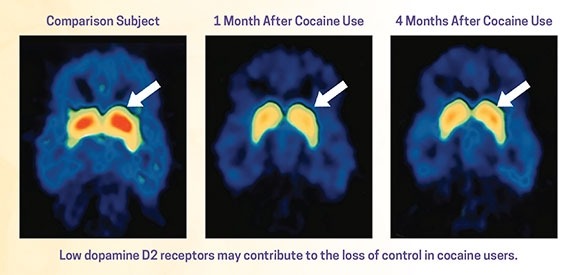According to the National Institute on Drug Abuse, "Addiction is defined as a chronic, relapsing brain disease that is characterized by compulsive drug seeking and use, despite harmful consequences. It is considered a brain disease because drugs change the brain—they change its structure and how it works. These brain changes can be long-lasting, and can lead to the harmful behaviors seen in people who abuse drugs."


Source of Image: NIDA from the Laboratories of Doctors N. Volkow and H. Schelbert. To learn more click here.
Early Signs
- A change in peer group
- Decline in academic performance
- Missing classes or skipping school
- Loss of interest in favorite activities
- Carelessness with grooming
- Changes in eating or sleeping habits
- Deteriorating relationships with family members and friends
Marijuana
- Red bloodshot eyes
- Very giddy
- Paranoid or anxious
- Increased appetite (the "munchies")
- Slowed speech/reactions
- Increased mood swings
- Odors remain on clothing
Alcohol
- Glassy and unfocused eyes
- Poor balance and reaction time
- Slurred speech
- Odor remains on breath
- Increased energy at night - sleepy in the morning
- Possible headache or vomitting after heavy consumption/binge drinking
Opiods (Prescription medications, heroin)
- Pinpoint pupils
- Fatigue
- Impaired condition
- Slowed breathing, heart rate, reflexes,
- Sleepiness or sedation
- Heroin smells like vinegar on breath
- High energy - then falls asleep
Cocaine, LSD, Ecstasy, Methamphetamines
- Pupils dilate - grow larger
- Needle tracks
- Runny nose, nose bleeds
- Paranoia or anxiousness
- Chronic bad breath - chemical, sulfur smell
- Smoked crack - smells of burning rubber
- Snorting - excessive nosebleeds or sniffles
- Manic episodes = lack of sleep
- Cocaine - breath smells of gasoline or ether
- Fast heart rate
- Agitation or erratic attention span
- Mood swings or depression
- Twitching, shaking, itching
- Hallucinations
Symptoms of Substance Use Dependency
According to Mayo Clinic, the following are signs and symptoms of drug and alcohol dependency.
Drug dependency symptoms or behaviors include, among others:
- Feeling that you have to use the drug regularly — daily or even several times a day
- Having intense urges for the drug that block out any other thoughts
- Over time, needing more of the drug to get the same effect
- Taking larger amounts of the drug over a longer period of time than you intended
- Making certain that you maintain a supply of the drug
- Spending money on the drug, even though you can't afford it
- Not meeting obligations and work responsibilities, or cutting back on social or recreational activities because of drug use
- Continuing to use the drug, even though you know it's causing problems in your life or causing you physical or psychological harm
- Doing things to get the drug that you normally wouldn't do, such as stealing
- Driving or doing other risky activities when you're under the influence of the drug
- Spending a good deal of time getting the drug, using the drug or recovering from the effects of the drug
- Failing in your attempts to stop using the drug
- Experiencing withdrawal symptoms when you attempt to stop taking the drug
Alcohol use disorder can be mild, moderate or severe, based on the number of symptoms you experience. Signs and symptoms may include:
- Being unable to limit the amount of alcohol you drink
- Wanting to cut down on how much you drink or making unsuccessful attempts to do so
- Spending a lot of time drinking, getting alcohol or recovering from alcohol use
- Feeling a strong craving or urge to drink alcohol
- Failing to fulfill major obligations at work, school or home due to repeated alcohol use
- Continuing to drink alcohol even though you know it's causing physical, social or interpersonal problems
- Giving up or reducing social and work activities and hobbies
- Using alcohol in situations where it's not safe, such as when driving or swimming
- Developing a tolerance to alcohol so you need more to feel its effect or you have a reduced effect from the same amount
- Experiencing withdrawal symptoms — such as nausea, sweating and shaking — when you don't drink, or drinking to avoid these symptoms
Do a quick self check
Self scoring test to assess alcohol dependency: American Addiction Centers
Other Tools for dependencies: National Institute on Drug Abuse
If you feel you may be struggling with substance use dependency, you are not alone. We are here to help. If you would like to talk to someone that may have a similar experience and that is in recovery, call 989-732-1791 to be matched up with a compassionate and supportive Peer Recovery Coach through the NMSAS Recovery Center. They can help guide you through the process and help you start working towards a lifestyle of recovery that is unique to you.

Addiction is a disease. We should treat it like one. - Michael Botticelli. Watch TED Talk
